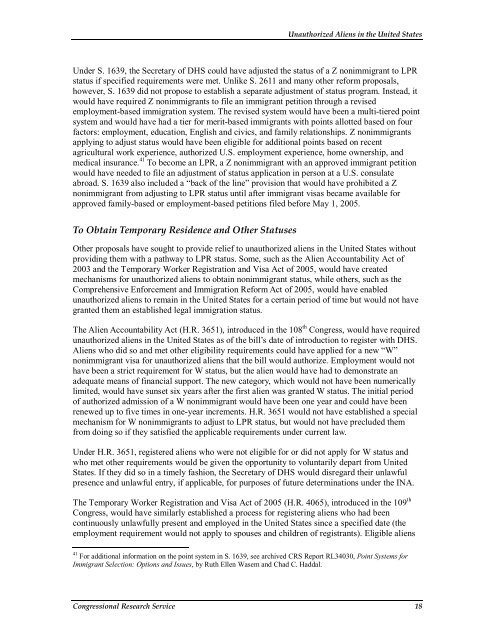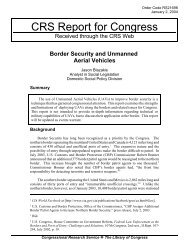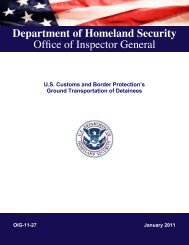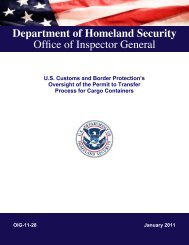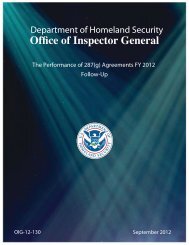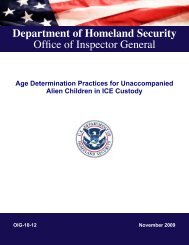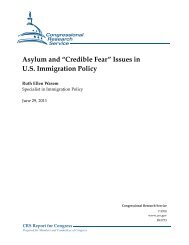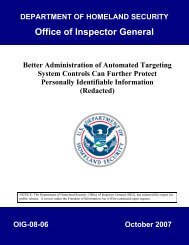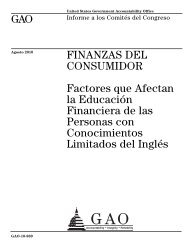Unauthorized Aliens in the United States - Federation of American ...
Unauthorized Aliens in the United States - Federation of American ...
Unauthorized Aliens in the United States - Federation of American ...
Create successful ePaper yourself
Turn your PDF publications into a flip-book with our unique Google optimized e-Paper software.
<strong>Unauthorized</strong> <strong>Aliens</strong> <strong>in</strong> <strong>the</strong> <strong>United</strong> <strong>States</strong><br />
Under S. 1639, <strong>the</strong> Secretary <strong>of</strong> DHS could have adjusted <strong>the</strong> status <strong>of</strong> a Z nonimmigrant to LPR<br />
status if specified requirements were met. Unlike S. 2611 and many o<strong>the</strong>r reform proposals,<br />
however, S. 1639 did not propose to establish a separate adjustment <strong>of</strong> status program. Instead, it<br />
would have required Z nonimmigrants to file an immigrant petition through a revised<br />
employment-based immigration system. The revised system would have been a multi-tiered po<strong>in</strong>t<br />
system and would have had a tier for merit-based immigrants with po<strong>in</strong>ts allotted based on four<br />
factors: employment, education, English and civics, and family relationships. Z nonimmigrants<br />
apply<strong>in</strong>g to adjust status would have been eligible for additional po<strong>in</strong>ts based on recent<br />
agricultural work experience, authorized U.S. employment experience, home ownership, and<br />
medical <strong>in</strong>surance. 41 To become an LPR, a Z nonimmigrant with an approved immigrant petition<br />
would have needed to file an adjustment <strong>of</strong> status application <strong>in</strong> person at a U.S. consulate<br />
abroad. S. 1639 also <strong>in</strong>cluded a “back <strong>of</strong> <strong>the</strong> l<strong>in</strong>e” provision that would have prohibited a Z<br />
nonimmigrant from adjust<strong>in</strong>g to LPR status until after immigrant visas became available for<br />
approved family-based or employment-based petitions filed before May 1, 2005.<br />
To Obta<strong>in</strong> Temporary Residence and O<strong>the</strong>r Statuses<br />
O<strong>the</strong>r proposals have sought to provide relief to unauthorized aliens <strong>in</strong> <strong>the</strong> <strong>United</strong> <strong>States</strong> without<br />
provid<strong>in</strong>g <strong>the</strong>m with a pathway to LPR status. Some, such as <strong>the</strong> Alien Accountability Act <strong>of</strong><br />
2003 and <strong>the</strong> Temporary Worker Registration and Visa Act <strong>of</strong> 2005, would have created<br />
mechanisms for unauthorized aliens to obta<strong>in</strong> nonimmigrant status, while o<strong>the</strong>rs, such as <strong>the</strong><br />
Comprehensive Enforcement and Immigration Reform Act <strong>of</strong> 2005, would have enabled<br />
unauthorized aliens to rema<strong>in</strong> <strong>in</strong> <strong>the</strong> <strong>United</strong> <strong>States</strong> for a certa<strong>in</strong> period <strong>of</strong> time but would not have<br />
granted <strong>the</strong>m an established legal immigration status.<br />
The Alien Accountability Act (H.R. 3651), <strong>in</strong>troduced <strong>in</strong> <strong>the</strong> 108 th Congress, would have required<br />
unauthorized aliens <strong>in</strong> <strong>the</strong> <strong>United</strong> <strong>States</strong> as <strong>of</strong> <strong>the</strong> bill’s date <strong>of</strong> <strong>in</strong>troduction to register with DHS.<br />
<strong>Aliens</strong> who did so and met o<strong>the</strong>r eligibility requirements could have applied for a new “W”<br />
nonimmigrant visa for unauthorized aliens that <strong>the</strong> bill would authorize. Employment would not<br />
have been a strict requirement for W status, but <strong>the</strong> alien would have had to demonstrate an<br />
adequate means <strong>of</strong> f<strong>in</strong>ancial support. The new category, which would not have been numerically<br />
limited, would have sunset six years after <strong>the</strong> first alien was granted W status. The <strong>in</strong>itial period<br />
<strong>of</strong> authorized admission <strong>of</strong> a W nonimmigrant would have been one year and could have been<br />
renewed up to five times <strong>in</strong> one-year <strong>in</strong>crements. H.R. 3651 would not have established a special<br />
mechanism for W nonimmigrants to adjust to LPR status, but would not have precluded <strong>the</strong>m<br />
from do<strong>in</strong>g so if <strong>the</strong>y satisfied <strong>the</strong> applicable requirements under current law.<br />
Under H.R. 3651, registered aliens who were not eligible for or did not apply for W status and<br />
who met o<strong>the</strong>r requirements would be given <strong>the</strong> opportunity to voluntarily depart from <strong>United</strong><br />
<strong>States</strong>. If <strong>the</strong>y did so <strong>in</strong> a timely fashion, <strong>the</strong> Secretary <strong>of</strong> DHS would disregard <strong>the</strong>ir unlawful<br />
presence and unlawful entry, if applicable, for purposes <strong>of</strong> future determ<strong>in</strong>ations under <strong>the</strong> INA.<br />
The Temporary Worker Registration and Visa Act <strong>of</strong> 2005 (H.R. 4065), <strong>in</strong>troduced <strong>in</strong> <strong>the</strong> 109 th<br />
Congress, would have similarly established a process for register<strong>in</strong>g aliens who had been<br />
cont<strong>in</strong>uously unlawfully present and employed <strong>in</strong> <strong>the</strong> <strong>United</strong> <strong>States</strong> s<strong>in</strong>ce a specified date (<strong>the</strong><br />
employment requirement would not apply to spouses and children <strong>of</strong> registrants). Eligible aliens<br />
41 For additional <strong>in</strong>formation on <strong>the</strong> po<strong>in</strong>t system <strong>in</strong> S. 1639, see archived CRS Report RL34030, Po<strong>in</strong>t Systems for<br />
Immigrant Selection: Options and Issues, by Ruth Ellen Wasem and Chad C. Haddal.<br />
Congressional Research Service 18


